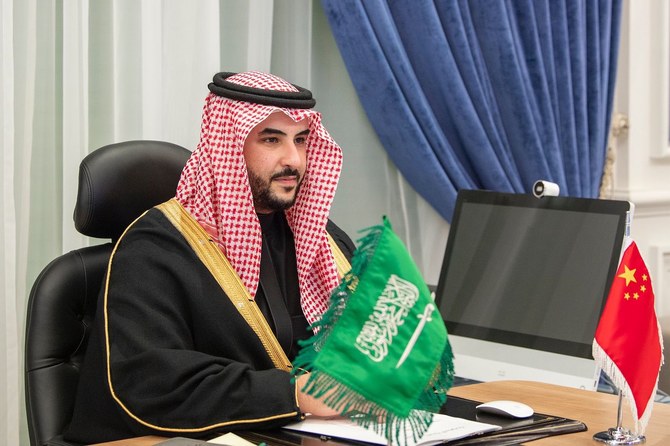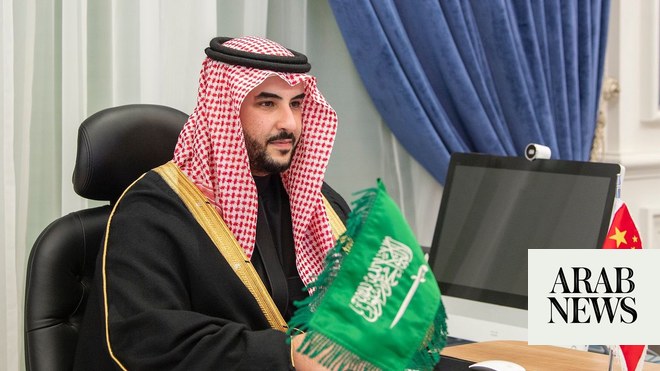China, Saudi Arabia set for closer military ties as sun sets for US in Middle East
Thu, January 27, 2022, 5:30 PM
Closer military ties with
Saudi Arabia are on the cards for China, which is expanding its presence in the
Middle East as US influence wanes.
Chinese Defence Minister General Wei Fenghe, meeting the Saudi deputy defence chief via video link, pledged to push forward "practical cooperation [and] strengthening solidarity" between the two armies.
China and Saudi Arabia should "strengthen coordination and jointly oppose hegemonic and bullying practices, to safeguard ... the interests of developing countries together", Wei told Prince Khalid bin Salman, the deputy defence minister of Saudi Arabia, in an apparent reference to the
United States.
Do you have questions about the biggest topics and trends from around the world? Get the answers with
SCMP Knowledge, our new platform of curated content with explainers, FAQs, analyses and infographics brought to you by our award-winning team.
The Chinese military was keen to "maintain strategic communication and push forward practical cooperation [with the Saudis]", Wei said, according to a defence ministry readout of Wednesday's virtual meeting.
In response, Khalid urged stronger cooperation "to enhance military ties to a higher level", the readout said.
Wei also acknowledged the Saudis' "strong support" for Beijing's policies on Taiwan, Hong Kong and
Xinjiang - all major friction points with the US. Saudi Arabia is a long-standing US ally.
"China appreciates the strong support given by the Saudi side on issues related to
Xinjiang, Hong Kong and Taiwan, and fully respects Saudi sovereignty and firmly supports [its chosen] development path," he told Prince Khalid.
The meeting comes at a time when China is stepping up its diplomatic offensive in the Middle East, a new arena in its great power rivalry with the US - as the once-dominant force in the region shows signs of retreat.
China is a key broker in talks to revive the 2015 Iran nuclear deal, which fell through after the US pulled out in 2018. The landmark multilateral accord offers Iran billions of dollars worth of sanctions relief in return for curbs on its nuclear programme.
In the latest sign of Beijing's growing influence in the conflict-ravaged but resource-rich Middle East, Foreign Minister Wang Yi earlier this month
hosted his counterparts from the Persian Gulf nations of Saudi Arabia, Kuwait, Oman and Bahrain, as well as the Gulf Cooperation Council (GCC) secretary general, in the eastern Chinese city of Wuxi.
Later, he also held separate meetings with the top diplomats of Iran and Turkey.
Wang Yi greets Kuwaiti Foreign Minister Sheikh Ahmad Nasser. Photo: AP alt=Wang Yi greets Kuwaiti Foreign Minister Sheikh Ahmad Nasser. Photo: AP>
Wang urged the Gulf states to speed up
free-trade talks with Beijing, a process which started in 2004 but had stalled since 2009 - after the GCC decided to suspend such talks outside the six-nation bloc, which also includes the United Arab Emirates and Qatar.
China is Saudi Arabia's top economic trading partner and the biggest importer of Saudi oil. During his meeting with Saudi Foreign Minister Prince Faisal bin Farhan al Saud, Wang described the two countries as "good friends, good partners and good brothers", and said relations with the oil-rich country were "a priority" for Beijing's foreign policy in the Middle East.
Saudi Arabia has in recent years bought armed drones from China, which were deployed in
Saudi-led air strikes in neighbouring Yemen, although the US remains the kingdom's largest weapons supplier.
Chinese arms sales to Saudi Arabia in 2016-20 rose by nearly 400 per cent from the previous five years.
CNN in December cited US assessment and satellite images to report that Saudi Arabia was building its own ballistic missiles with the assistance of China. That has sparked worries about complicating Washington's efforts to bring Iran - the Saudis' top regional rival - back to the negotiation table on the nuclear deal.
US-Saudi relations have also become strained in recent years over human rights concerns and the 2018 killing of
Washington Post columnist
Jamal Khashoggi in the
Saudi consulate in Istanbul.
Since taking office, US President
Joe Biden has only spoken once with King Salman -
in February last year - and has yet to officially visit what is one of Washington's strongest allies in the Middle East.
Saudi Arabia was the first foreign port of call for Biden's predecessor Donald Trump when he came to power in 2017.
This article originally appeared in the
South China Morning Post (SCMP), the most authoritative voice reporting on China and Asia for more than a century. For more SCMP stories, please explore the
SCMP app or visit the SCMP's
Facebook and
Twitter pages. Copyright © 2022 South China Morning Post Publishers Ltd. All rights reserved.
Closer military ties with Saudi Arabia are on the cards for China, which is expanding its presence in the Middle East as US influence wanes. Chinese Defence Minister General Wei Fenghe, meeting the Saudi deputy defence chief via video link, pledged to push forward "practical cooperation [and]...

finance.yahoo.com



 www.arabnews.com
www.arabnews.com


 www.arabnews.com
www.arabnews.com


